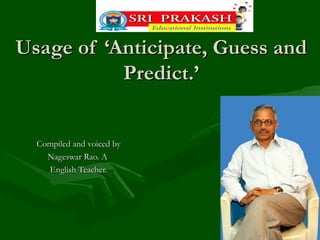
Usage of 'anticipate, predict and guess.
- 1. Usage of ‘Anticipate, Guess andUsage of ‘Anticipate, Guess and Predict.’Predict.’ Compiled and voiced byCompiled and voiced by Nageswar Rao. ANageswar Rao. A English Teacher.English Teacher.
- 2. We use both “anticipate” and “predict” when talking about what weWe use both “anticipate” and “predict” when talking about what we or another person think will happen in the future. The difference isor another person think will happen in the future. The difference is that we use “anticipate” when the event will happen in the nearthat we use “anticipate” when the event will happen in the near future or at a specific time. We usually use “predict” when thefuture or at a specific time. We usually use “predict” when the event will happen further in the future or when we don’t know theevent will happen further in the future or when we don’t know the specific time.specific time. In addition, when we use “anticipate”, it sounds like we have someIn addition, when we use “anticipate”, it sounds like we have some information that allows us to guess what will happen. When we useinformation that allows us to guess what will happen. When we use ““predict”, we may or may not have some information which helpspredict”, we may or may not have some information which helps us to guess what will happen. Generally, it sounds like it’s simplyus to guess what will happen. Generally, it sounds like it’s simply the person’s opinion about what will happen.the person’s opinion about what will happen. Guess; imply attempting to form an opinion as to the probable. ToGuess; imply attempting to form an opinion as to the probable. To guess is to risk an opinion regarding something one does not knowguess is to risk an opinion regarding something one does not know about, or, by chance, to arrive at the correct answer to a question:about, or, by chance, to arrive at the correct answer to a question: to guess the outcome of a game.to guess the outcome of a game.
- 3. WeWe anticipateanticipate at least 50 people will come to the party, so we’dat least 50 people will come to the party, so we’d better make sure we have enough food for everyone.better make sure we have enough food for everyone. The weather forecaster said theyThe weather forecaster said they anticipateanticipate that the storm will hitthat the storm will hit our city at about 9:00 p.m. tonight.our city at about 9:00 p.m. tonight. OurOur anticipatedanticipated arrival time is 8.30.arrival time is 8.30. II predictpredict that people will live on the moon within 100 years.that people will live on the moon within 100 years. Everyone in high schoolEveryone in high school predictedpredicted that Rajesh would become anthat Rajesh would become an IAS one day, and they were right.IAS one day, and they were right. The trialThe trial predictedpredicted to last for years.to last for years. We can onlyWe can only guessguess at her reasons for leaving.at her reasons for leaving. I wouldI would guessguess that she’s about 30.that she’s about 30.
- 4. Visit us at “ayalasomayajula nageswar rao” For More videos on Functional & Usage Grammar. Subscribe to our channel on You Tube
